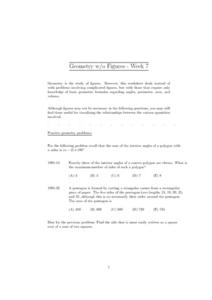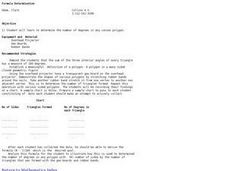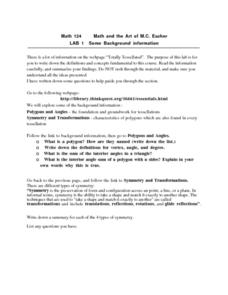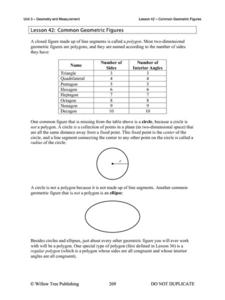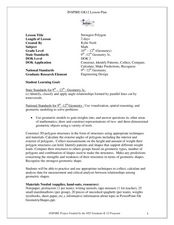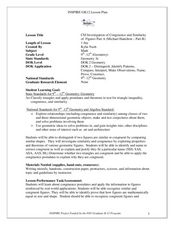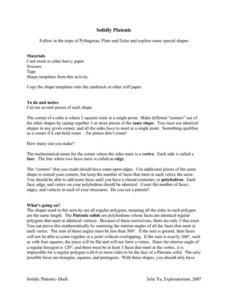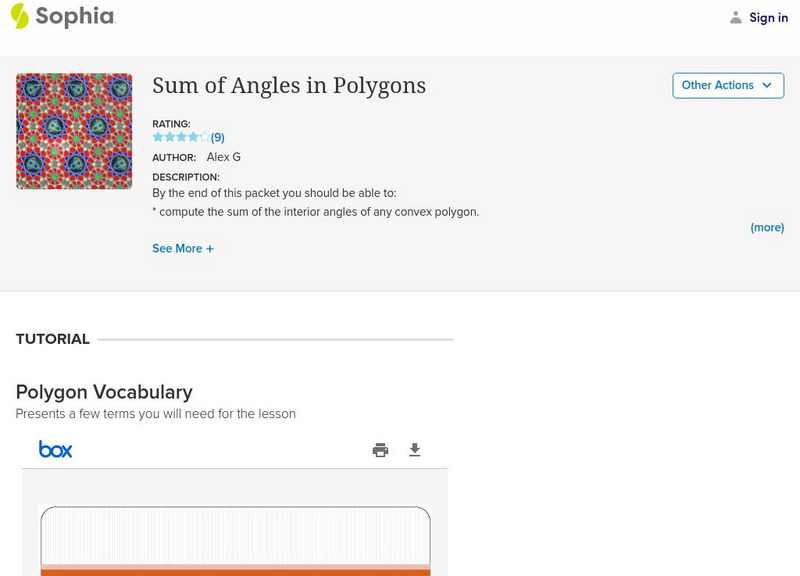Curated OER
Geometry w/o Figures - Week 7 (Basic Geometry Formulas)
In this basic geometry worksheet, students use basic formulas of geometry to find the area of a polygons, the number of sides of a polygon, and sum of the angles of various polygons. This three-page worksheet contains eight problems.
Curated OER
Formula Determination
Students derive a formula for the interior degrees in any convex polygon. In this geometric figure instructional activity, students determine the shapes of various polygons and the number of triangles formed. They use this information to...
Curated OER
Pattern Block Polygons
Sixth graders create polygons. In this shapes lesson, 6th graders explore prefixes such as oct, tri, quad, pent, etc. and share their findings. Students use pattern blocks to create two different polygons and label them.
Curated OER
Algebra/Geometry Institute: Area of Polygons
Students find the area of polygons. In this area of polygons lesson, students find the area of parallelograms, rectangles, squares, and other polygons. They identify each given figure and determine the appropriate formula needed to...
Curated OER
Forty Mental Math Angle Problems
In this angle worksheet, students answer forty mental math questions divided into four problem sets. These problems require students to remember angle facts and so simple calculations mentally.
Curated OER
Math Lab
In this polygons and angles worksheet, 10th graders complete 5 different questions related to polygons and angles, in addition to symmetry and transformations. First, they define polygon and how they are named. Then, students define...
Mt. San Antonio Collage
Properties of a Parallelogram
More than just a worksheet, the resource provides a thorough guide to navigate through the land of parallelograms. Filled with definitions and theorems, the resource supports learners through problems such as proofs and finding missing...
Curated OER
Angles and Parallel Lines
Sixth graders draw parallel and intersecting lines to observe and examine the characteristics of alternate interior angles, vertical angles, corresponding angles, and supplementary angles. Through observation, they discover the...
Curated OER
Geometric Shapes and Angles
In this geometry worksheet, 10th graders review polygons and solve for the missing angles of trapezoids and isosceles triangles. There are 10 questions on this worksheet with an answer key.
Curated OER
Patterns in the Sums of Polygon Angles
Sixth graders discover the patterns of sums of polygon angles. In this math lesson plan, 6th graders study the properties of geometric shapes to solve problems as they participate in hands-on activities.
Curated OER
Polygons Multiple Choice
In this geometry worksheet, students identify the interior and exterior angles using the angle sum theorem. They identify and solve quadrilaterals using properties of quadrilaterals. There are 12 questions with an answer key.
Willow Tree
Common Geometric Figures
Geometry could be called the study of figures. An overview of the figures found in a typical geometry course contains a study of different triangles, quadrilaterals, and regular polygons.
Curated OER
Strongest Polygon
Students define and identify shapes by name. In this geometry lesson, students construct, identify and compare polygons based on the number of sides. They classify each shape based on their angle sum theorem.
Curated OER
Polygons All Around Us!
Pupils explore the concept of polygon properties. In this polygon properties lesson, students draw polygons with different numbers of sides such as pentagons, octagons, hexagons, etc. Pupils identify different geometric shapes in the...
Curated OER
More on Tessellations
In this tessellations worksheet, 10th graders solve 3 different word problems that include creating various tessellations. First, they group pentagons around a vertex so the angles add up to 360 and determine whether the pentagons can...
Curated OER
Quadrilaterals
For this geometry worksheet, 10th graders solve problems with quadrilaterals. They calculate the sum of the angles, find missing angles and identify properties of quadrilaterals. There are 16 questions with an answer key.
Curated OER
Perimeter
In this perimeter instructional activity, 10th graders solve and complete nineteen various geometry problems. First, they find the length of given segments in addition to the perimeter of a kite. Then, students find the value of a...
Curated OER
CSI Investigation of Congruence and Similarity
Students differentiate between similarity and congruence using polygons. In this geometry lesson, students label triangles based on their properties. They find missing sides and angles using the interior sum theorem.
Willow Tree
The Pythagorean Theorem
There isn't a more popular geometry formula than the Pythagorean Theorem! Learners understand the special side relationships in a right triangle. They use the Pythagorean Theorem to find missing sides and to solve problems. They begin...
Curated OER
Solidly Platonic
When they do, they learn. Using this resource, young mathematicians learn about platonic solids by actually building, touching, and examining the shapes. They connect their observations about the shapes to Euler's formula.
Curated OER
Designing a Quilt Pattern
Students create and color a one-patch quilt design based upon a regular hexagon. They examine quilts and photos of quilt designs, read a handout, and complete their quilt design on a worksheet.
Sophia Learning
Sophia: Sum of Angles in Polygons
This tutorial with video and slideshow components investigate the characteristics of polygons as well as how to calculate the interior and exterior angles of any polygon. It offers two PowerPoint presentations and two videos that feature...
Math Is Fun
Math Is Fun: Interior Angles of Polygons
Learn what an interior angle of a polygon is and how you can calculate their value in triangles, quadrilaterals, and pentagons. Includes a chart that overviews the "general rule" for determining the sum of internal angles in any polygon...
Texas Education Agency
Texas Gateway: Making Conjectures About Other Polygons
Given information about the properties of polygons, students will verify theorems about the relationships, including the sum of interior angles, and apply these relationships to solve problems.


